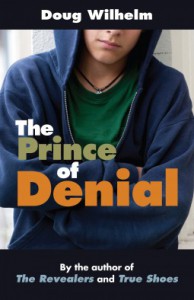
Dealing with Dad

Picture a troubled teen quietly removing this book from the school library shelves, then sitting down between the book stacks and devouring it. Maybe the teenager thought he was the only one hiding a terrible secret about his home life, but after a few pages of Doug Wilhelm’s accessible, educational novel, he will realize there are others just like him, and that there is hope. In The Prince of Denial—Wilhelm’s latest in an acclaimed middle-school series that has taken on tough topics like bullying and cyberbullying—the prolific author tackles the effects of alcoholism on families and, most of all, kids.
Using casual, convincing dialogue, Wilhelm drops readers right into the life of Casey Butterfield, seventh grader, on the first page. Casey is trading jokes with his comedic buddy, Oscar, and all is lighthearted. Except it’s not. Casey can’t really let go and hang out with his friend anymore because he needs to get home—and quickly. There are things he has to take care of, like cleaning the house, making dinner, and dealing with his unpredictable alcoholic father. Deeply embarrassed by his home life, Casey tells Oscar none of this; he just disappears like clockwork every day after school.
Wilhelm capably takes Casey through the psychological stages familiar to many relatives of addicts: denial, shame, understanding, and, finally, action. The tone ranges from realistic to more scripted, depending on whether teens or adults are speaking.
Although The Prince of Denial risks straying into the lesson-laden territory of a television after-school special, it goes refreshingly off-script just when least expected. All signs point to a textbook intervention arranged by Casey’s Aunt Julie and hosted by Casey himself; but at the last minute, Casey changes tactics.
The results are compellingly tension-filled and complex, and ultimately more satisfying than an ending that ties everything up neatly. Casey’s life gets better, but it doesn’t get all better, all at once. The realism will ring true for adolescent readers who might have come away from a storybook ending with more doubts than answers. In Casey, instead, they have a relatable role model for how to handle the tough stuff in their own lives.
Sheila M. Trask for ForeWord Reviews
November 30, 2013



